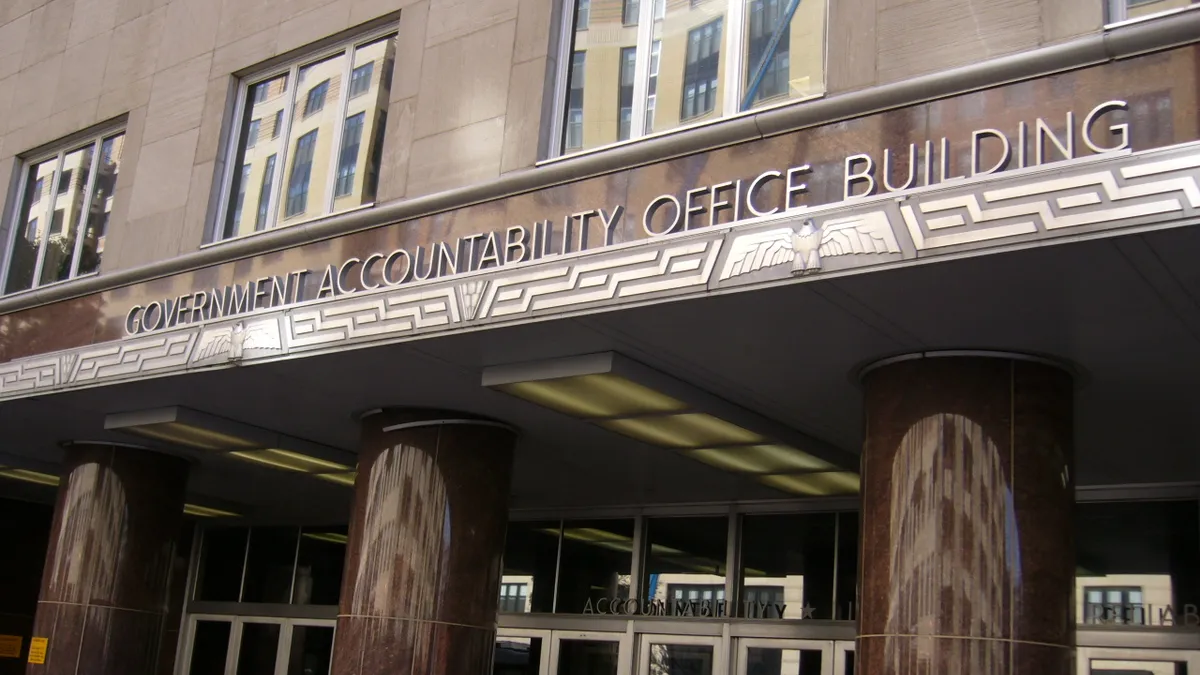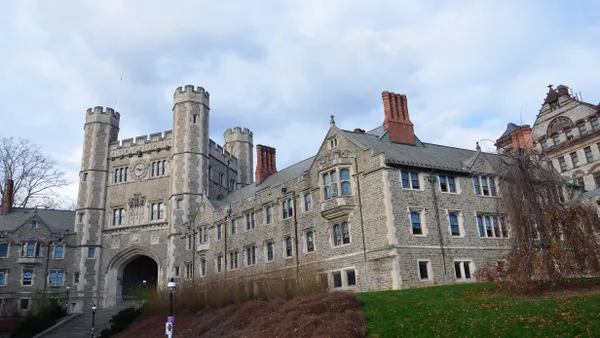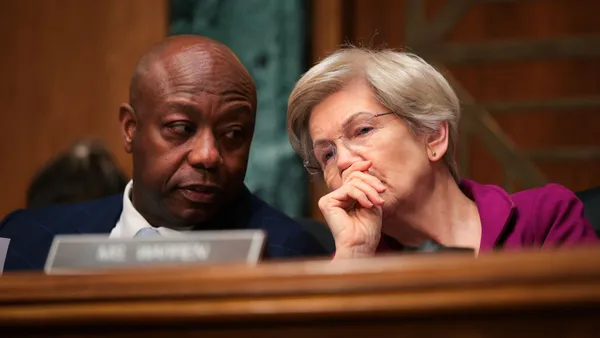Dive Brief:
- The U.S. Department of Education didn't take steps needed to ensure all student loan debts eligible for forgiveness under Income-Driven Repayment plans had been canceled, according to a Government Accountability Office report publicly released Wednesday.
- Just 157 loans had been approved for forgiveness as of June 1, 2021, according to the report. Another 7,700 loans worth about $49 million in outstanding debt — 11% of all loans analyzed — might have been eligible for forgiveness, the GAO determined. But Ed Department repayment data wasn't enough to allow the GAO to conclude why they hadn't been forgiven.
- The report also highlighted failures to communicate the program's intricacies to borrowers. The Ed Department doesn't provide information such as what payments qualify toward forgiveness, possibly leaving borrowers unaware that time in forbearance and deferment doesn't usually count, the GAO said. The agency and loan servicers also don't give regular updates to borrowers in Income-Driven Repayment plans about how many qualifying payments they've made, nor do they tell all borrowers they can request and verify such counts.
Dive Insight:
The report from the GAO, an auditing agency for Congress, comes at a time of intense scrutiny of Income-Driven Repayment, or IDR, plans. The plans are intended to lower monthly payments for many federal student borrowers by basing them on income. In return, the loan terms are extended from 10 years to 20 years or 25 years, after which point borrowers can be eligible for having remaining balances forgiven.
But the actual repayment period under IDR can vary based on a plan's specifics and borrower's repayment history. Loans in IDR can be repaid in full before they qualify for forgiveness, and payments made in certain statuses like deferment and forbearance haven't typically counted toward the loan forgiveness threshold.
Earlier this month, an NPR investigation found wide-ranging flaws in the system, including that loan servicers sometimes weren't tracking when borrowers qualified for loan cancellation. Then on Tuesday, the Ed Department announced a series of changes and accused loan servicers of improperly steering borrowers into forbearance — which can allow borrowers to temporarily make smaller or no principal payments — instead of IDR plans. The federal agency said the changes will wipe clear debts from tens of thousands of borrowers.
Problems with the IDR system are likely to become increasingly apparent — and important to the higher ed sector. Ed Department data shows the number of loans possibly qualifying for IDR forgiveness could climb to 1.5 million by 2030.
The Ed Department started its first IDR plan in 1994 and has since expanded the program. About half of $1 trillion-plus in outstanding federal student Direct Loans are currently being repaid under IDR plans, the GAO found.
For its report, the GAO evaluated Ed Department data on IDR loans that had been in repayment long enough to possibly qualify for forgiveness as of September 2020. It also looked at data on loans forgiven as of June 2021 and interviewed department officials and loan servicers.
The resulting data showed 62,600 loans not eligible for forgiveness because they lacked enough qualifying payments. But Ed Department officials told the GAO that data limitations make it hard to track some qualifying payments and that some older loans are at heightened risk for tracking errors.
"Until Education takes steps to address such errors, some borrowers may not receive the IDR forgiveness they are entitled," the GAO report said.
It made five recommendations for the Ed Department:
- Establish procedures to identify loans at higher risk of having payment tracking errors and take measures to ensure eligible borrowers with such loans are forgiven in a timely manner.
- Ensure additional information about IDR forgiveness rules and requirements is communicated to borrowers enrolled in IDR plans.
- Ensure IDR borrowers are regularly told they can request their counts of qualifying payments toward IDR forgiveness and verification of those counts.
- Establish procedures to verify qualifying payment counts at borrowers' request so that inaccuracies can be fixed.
- Ensure regular updates on qualifying payment counts are, at very least, given to borrowers whose loans were not covered under the Ed Department's original Direct Loan program servicer.
The Ed Department concurred with each of the report's recommendations, according to a February letter to the GAO from Richard Cordray, chief operating officer of the Federal Student Aid office. The department also generally acknowledged challenges with tracking payments toward forgiveness.
"This varied set of related programs stretches back many years and has long been a source of confusion and frustration for many borrowers," Cordray wrote. "We are fully committed to improving the program and the borrower experience through administrative, operational and ongoing regulatory work."
The report sparked concern among advocates for widespread student access to higher education.
Michele Streeter is associate director of policy and advocacy at The Institute for College Access & Success, which aims to promote affordability and equity in higher ed.
"This is really concerning, and it undermines faith in the repayment system," Streeter said. "As long as we have a student loan system and repayment system, IDR is a really important safety net. But if it's not working as a safety net, then that's a huge problem."
Streeter said administrative problems in the student loan system could hurt open access to federal financial aid in the future.
"Institutions need to be aware that the more and more the system breaks down, and the more harm it's doing to individuals, it is not a system that can indefinitely hold," Streeter said.
A policy expert at the Student Borrower Protection Center, an advocacy group, said in a statement that the report shows students "have been robbed of time" that should count towards their debts being canceled and also called for widespread debt cancellation.
"It defies logic to believe that such abusive practices are limited to one program," Persis Yu, the organization's policy director and managing counsel, said in the statement. "The problems identified suggest a much deeper systemic problem within the student loan system.















